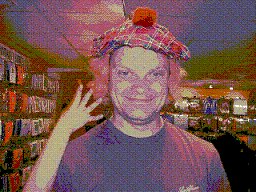All the presentations through the week were of a very high quality, and it was good to hear stories from contexts very different from what we face in the UK. But some of those I found most stimulating came from cultural situations not so very far removed from the context into which we seek to do mission in the UK.
The Scandinavian countries and Germany, for instance, are beginning to see similar levels of apathy and disinterest from the un-churched in their communities – especially in the larger cities where postmodernity and capitalism have taken a strong hold. However, much of their mission is still to the ‘de-churched’, as many if not most of the members of the population have some significant church background. In Denmark, for instance, the state church is financed by a church tax, and 85% of the population are baptised as infants and confirmed (even if they go on to leave the church in adult life).
At the Lutheran Cathedral in Copenhagen an evangelistic project, ‘Night Church’, has had some success in reaching these de-churched (not un-churched) people, and re-connecting them with God and with the church. A phrase written in the visitors’ book at the Night Church reads: “It’s unbelievably beautiful to meet this quietness, this space in the night. I will put the Cathedral high on my agenda in the years to come”. Right in the middle of the city’s noise, the project provides an opportunity for “outsiders” and for the “seekers” to meet, to have a cup of tea or coffee together, to write, to walk around, or simply to kneel and pray.
The Night Church is an effort to do mission and evangelism in the context of a Western, postmodern and secularised society, providing a light in the middle of the night, not only at the end of the day, but also in the darkness of the people’s lives, thirsty for the good news of Gospel of Jesus Christ. It is a project involving twelve different churches who are struggling to be faithful to the Lord, and attempting to find new forms of being the Body of Christ, in a meaningful way, in the midst of a meaningless society.
Frequently Cathedrals have been used for performing concerts and this is also the case in Copenhagen, but what makes the experience unique is the way that art is used as an instrument to share the good news. Furthermore the regular church activities such as worship, Holy Communion, reading and interpreting the Bible, prayers, etc., are developed in an innovative way, enabling people to feel welcome and embraced. But perhaps the most meaningful characteristic of the project is sharing in the love of Christ “doing nothing”, just being in calm, in silence.
Those who plan the Night Church services are keen to combine holiness with the everyday life and language of the city. Both forms of speech are necessary , because modern people often fail to understand what the church is talking about: religious matters must be spoken about in everyday terms. They believe that God is already in our everyday lives, but that church can function as a refuge from the demands of the world, and a place where our connection with God is renewed. And so the Night Church functions as just such a place, and embraces all people (rich/poor, old/young, drunk/sober, new/traditional church-goers).
Monday, September 11, 2006
Subscribe to:
Post Comments (Atom)


No comments:
Post a Comment